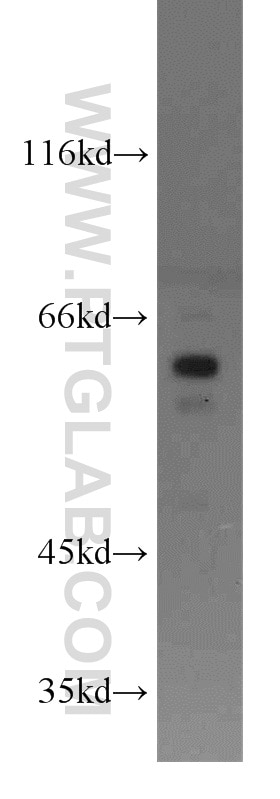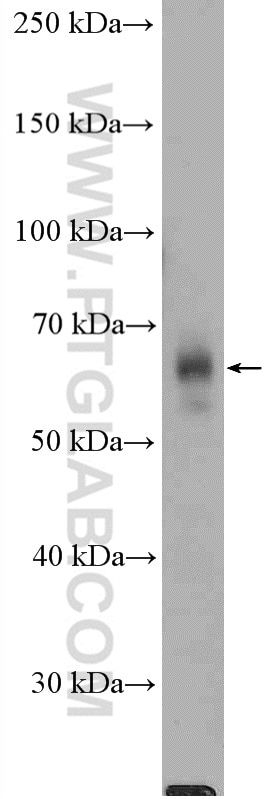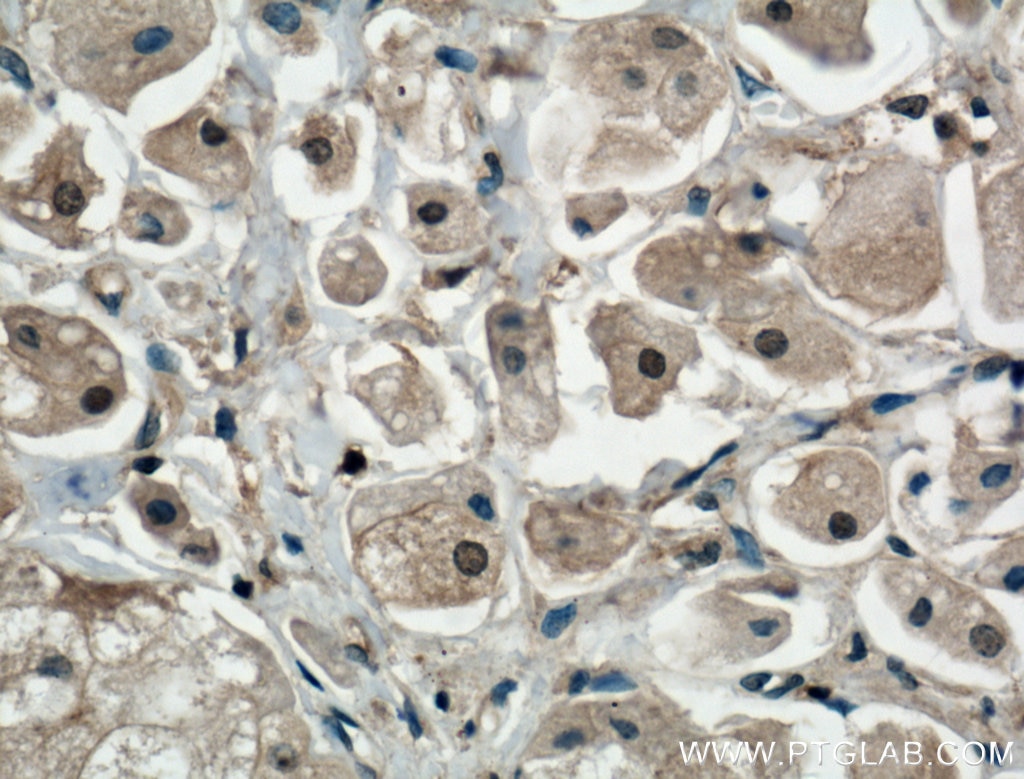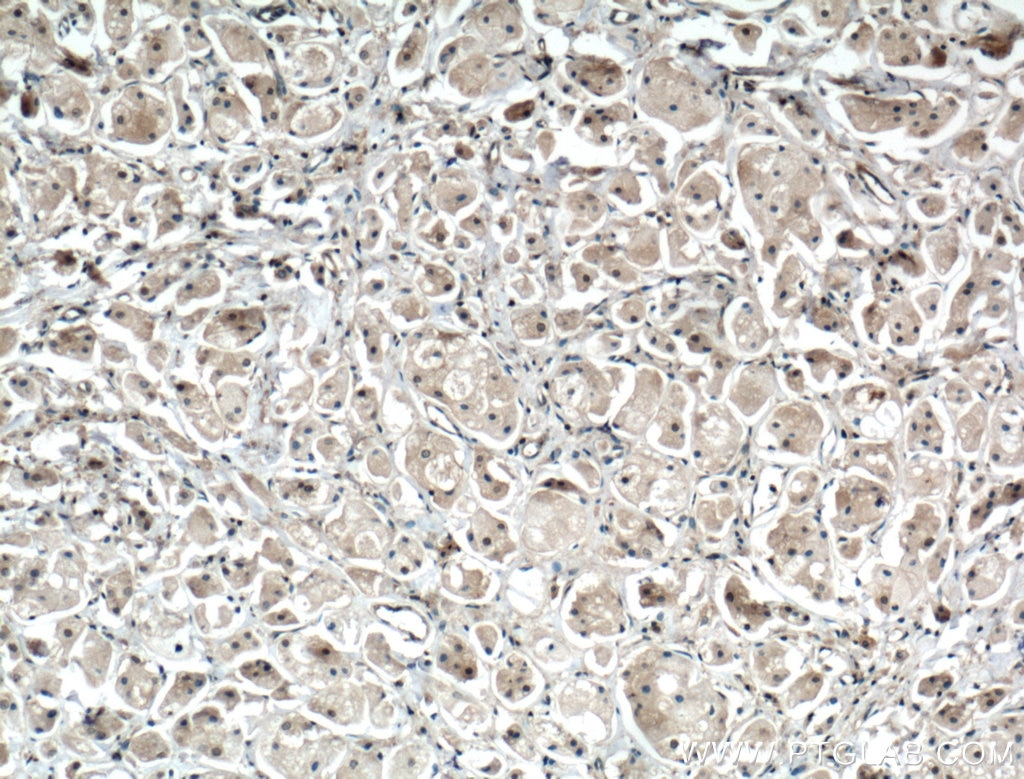- Featured Product
- KD/KO Validated
PDPK1 Polyklonaler Antikörper
PDPK1 Polyklonal Antikörper für WB, IHC, ELISA
Wirt / Isotyp
Kaninchen / IgG
Getestete Reaktivität
human und mehr (1)
Anwendung
WB, IHC, IF, ELISA
Konjugation
Unkonjugiert
Kat-Nr. : 17086-1-AP
Synonyme
Geprüfte Anwendungen
| Erfolgreiche Detektion in WB | MCF-7-Zellen, LNCaP-Zellen |
| Erfolgreiche Detektion in IHC | humanes Mammakarzinomgewebe Hinweis: Antigendemaskierung mit TE-Puffer pH 9,0 empfohlen. (*) Wahlweise kann die Antigendemaskierung auch mit Citratpuffer pH 6,0 erfolgen. |
Empfohlene Verdünnung
| Anwendung | Verdünnung |
|---|---|
| Western Blot (WB) | WB : 1:500-1:2000 |
| Immunhistochemie (IHC) | IHC : 1:50-1:500 |
| It is recommended that this reagent should be titrated in each testing system to obtain optimal results. | |
| Sample-dependent, check data in validation data gallery | |
Veröffentlichte Anwendungen
| KD/KO | See 3 publications below |
| WB | See 13 publications below |
| IHC | See 2 publications below |
| IF | See 1 publications below |
Produktinformation
17086-1-AP bindet in WB, IHC, IF, ELISA PDPK1 und zeigt Reaktivität mit human
| Getestete Reaktivität | human |
| In Publikationen genannte Reaktivität | human, Maus |
| Wirt / Isotyp | Kaninchen / IgG |
| Klonalität | Polyklonal |
| Typ | Antikörper |
| Immunogen | PDPK1 fusion protein Ag9213 |
| Vollständiger Name | 3-phosphoinositide dependent protein kinase-1 |
| Berechnetes Molekulargewicht | 556 aa, 63 kDa |
| Beobachtetes Molekulargewicht | 60-63 kDa |
| GenBank-Zugangsnummer | BC012103 |
| Gene symbol | PDPK1 |
| Gene ID (NCBI) | 5170 |
| Konjugation | Unkonjugiert |
| Form | Liquid |
| Reinigungsmethode | Antigen-Affinitätsreinigung |
| Lagerungspuffer | PBS with 0.02% sodium azide and 50% glycerol |
| Lagerungsbedingungen | Bei -20°C lagern. Nach dem Versand ein Jahr lang stabil Aliquotieren ist bei -20oC Lagerung nicht notwendig. 20ul Größen enthalten 0,1% BSA. |
Hintergrundinformationen
3-Phosphoinositide dependent protein kinase-1 (PDK1 or PDPK1) is a serine-threonine kinase belonging to AGC kinase family. PDK1 plays a critical role in establishing ACD (Asymmetric cell division) in the epithelium (PMID: 27184845). The kinase activity of PDK1 depends on phosphatidyl inositol 3-kinase (PI3K), a key intermediate in signaling pathways including those from growth factor receptors and adhesion molecules. Substrates of PDK1, including AKT and the protein kinase C (PKC) isozymes, regulate a number of essential cell functions (PMID: 20027184). PDPK1 has 5 isoforms produced by alternative splicing of 48~63 kDa and is detected as 60-63 kDa.
Protokolle
| PRODUKTSPEZIFISCHE PROTOKOLLE | |
|---|---|
| WB protocol for PDPK1 antibody 17086-1-AP | Protokoll herunterladen |
| IHC protocol for PDPK1 antibody 17086-1-AP | Protokoll herunterladenl |
| STANDARD-PROTOKOLLE | |
|---|---|
| Klicken Sie hier, um unsere Standardprotokolle anzuzeigen |
Publikationen
| Species | Application | Title |
|---|---|---|
Mol Cell A Non-canonical PDK1-RSK Signal Diminishes Pro-caspase-8-Mediated Necroptosis Blockade.
| ||
Cell Mol Life Sci Phosphocholine inhibits proliferation and reduces stemness of endometrial cancer cells by downregulating mTOR-c-Myc signaling | ||
PLoS Biol Loss of hepatic aldolase B activates Akt and promotes hepatocellular carcinogenesis by destabilizing the Aldob/Akt/PP2A protein complex. | ||
Free Radic Biol Med Redox sensor NPGPx restrains ZAP70 activity and modulates T cell homeostasis. | ||
Front Immunol Identification of senescence-related subtypes, establishment of a prognosis model, and characterization of a tumor microenvironment infiltration in breast cancer
| ||
J Innate Immun Mannan-Binding Lectin Reduces Epithelial-Mesenchymal Transition in Pulmonary Fibrosis via Inactivating the Store-Operated Calcium Entry Machinery. |





